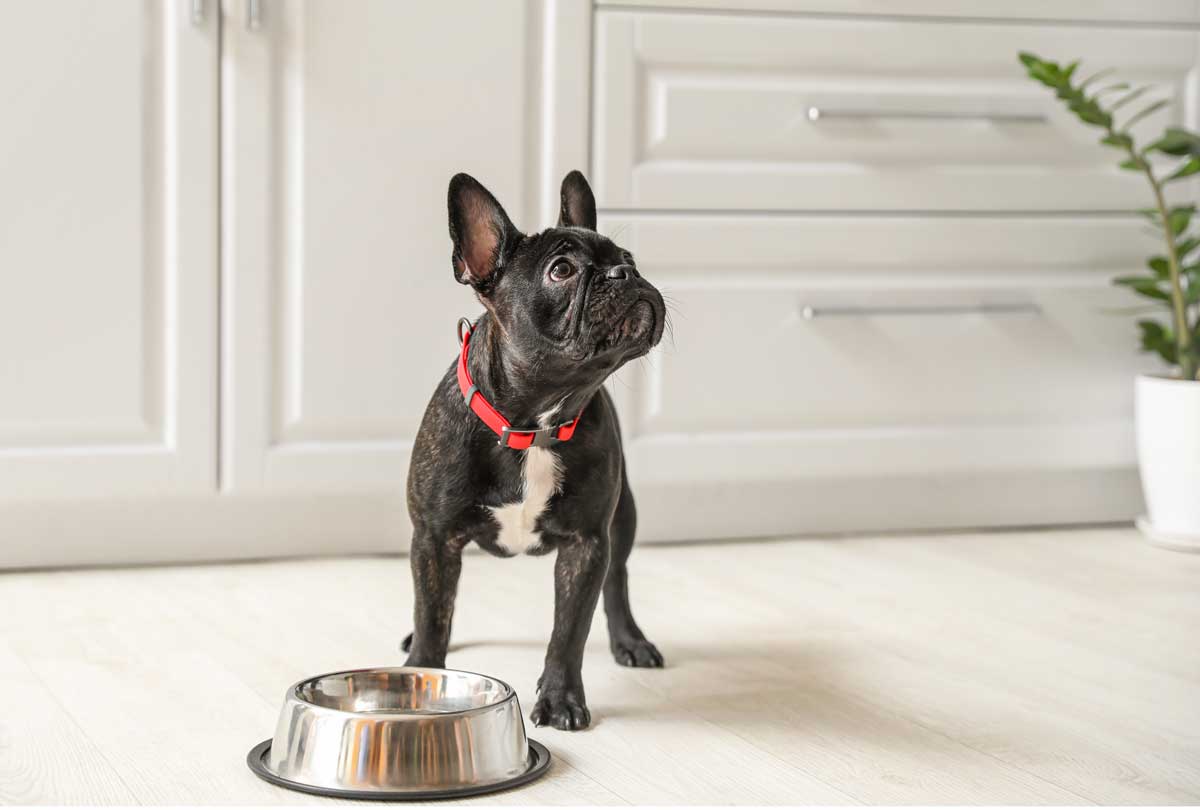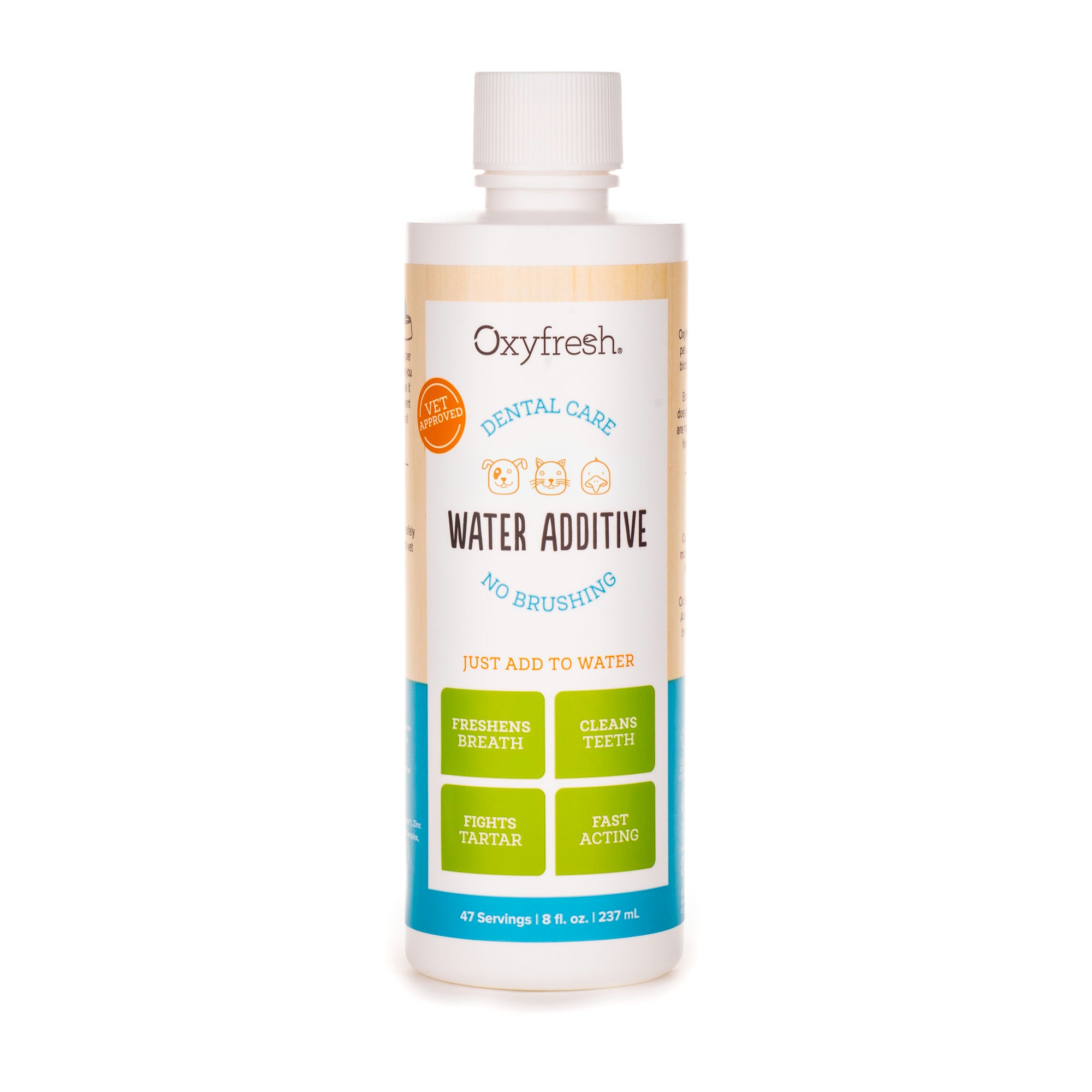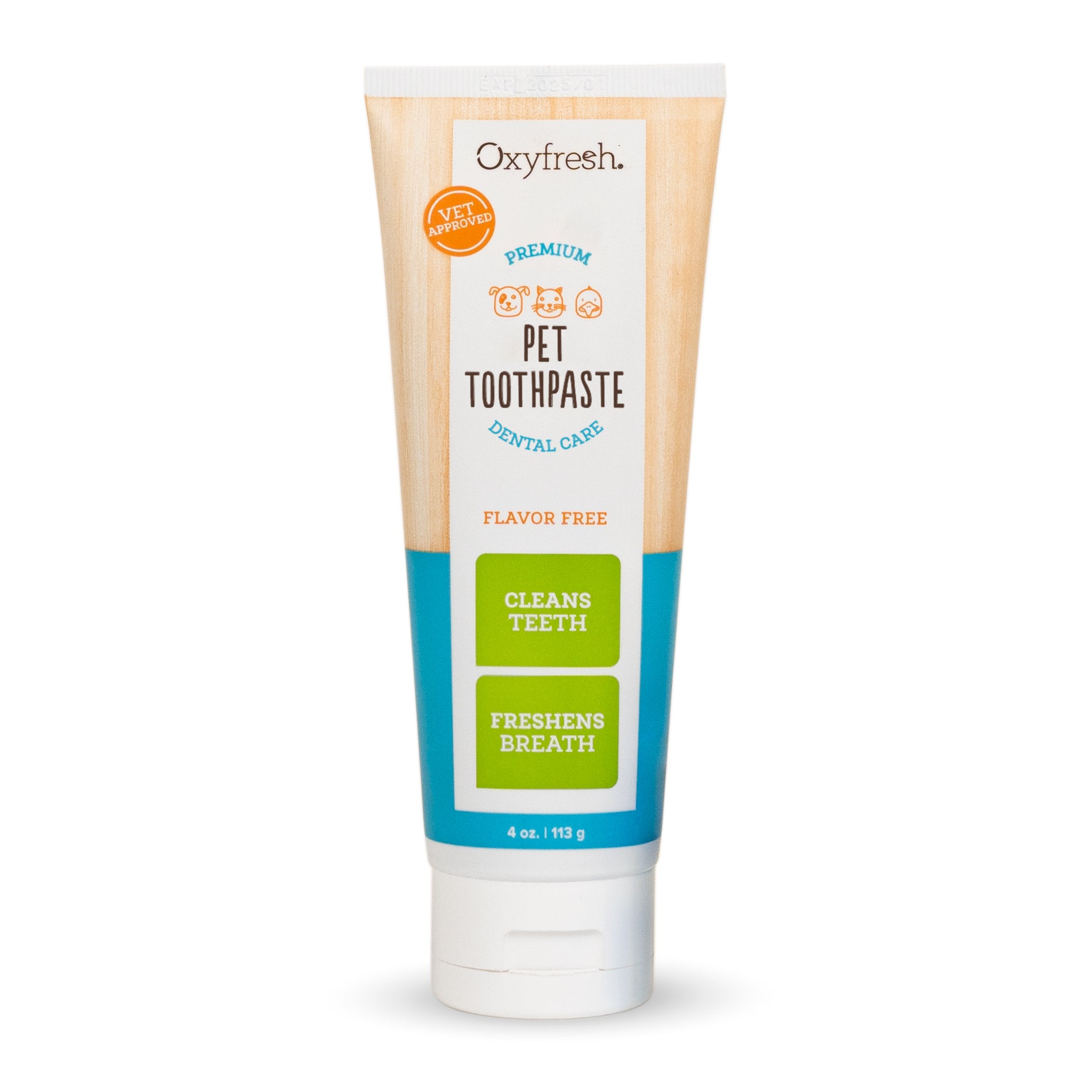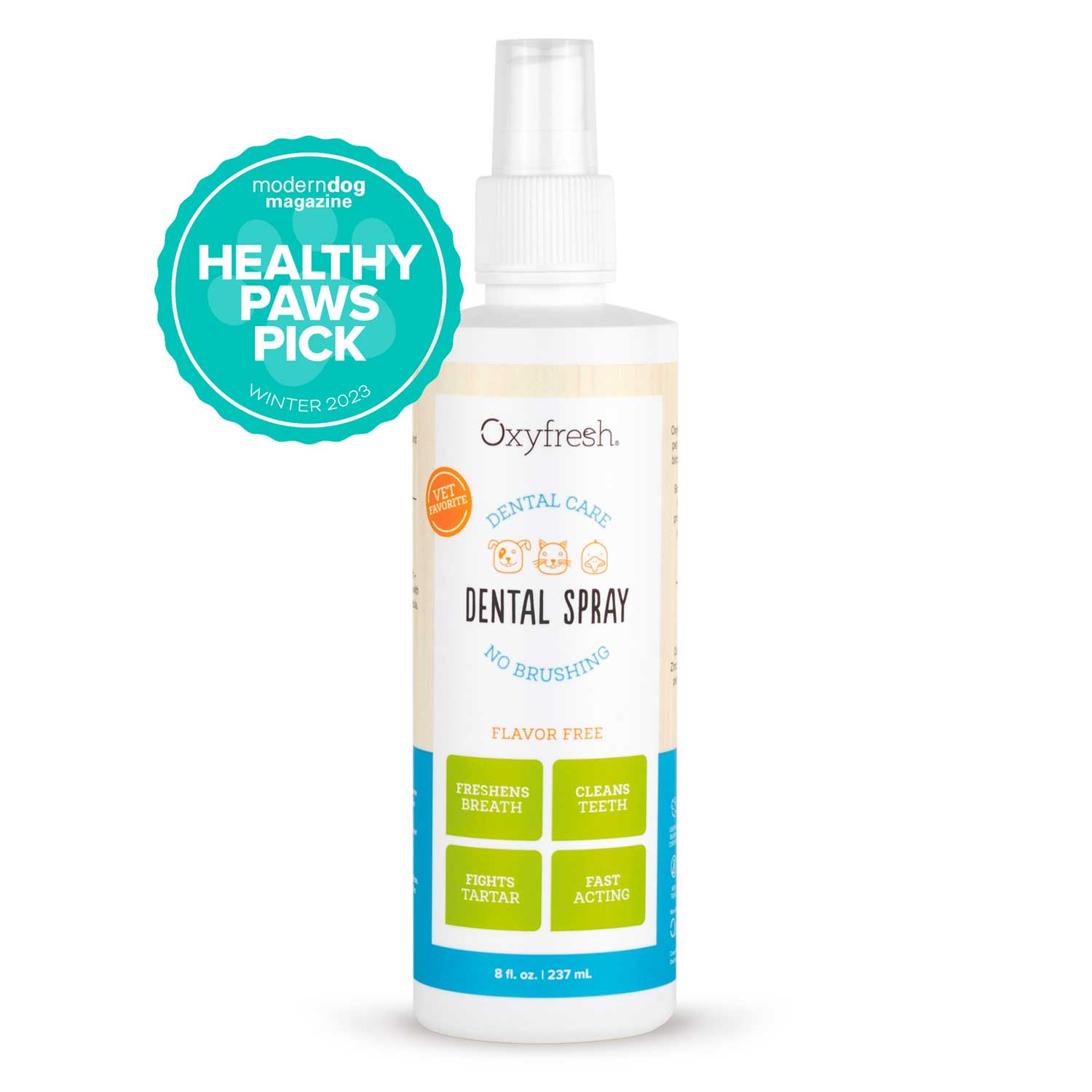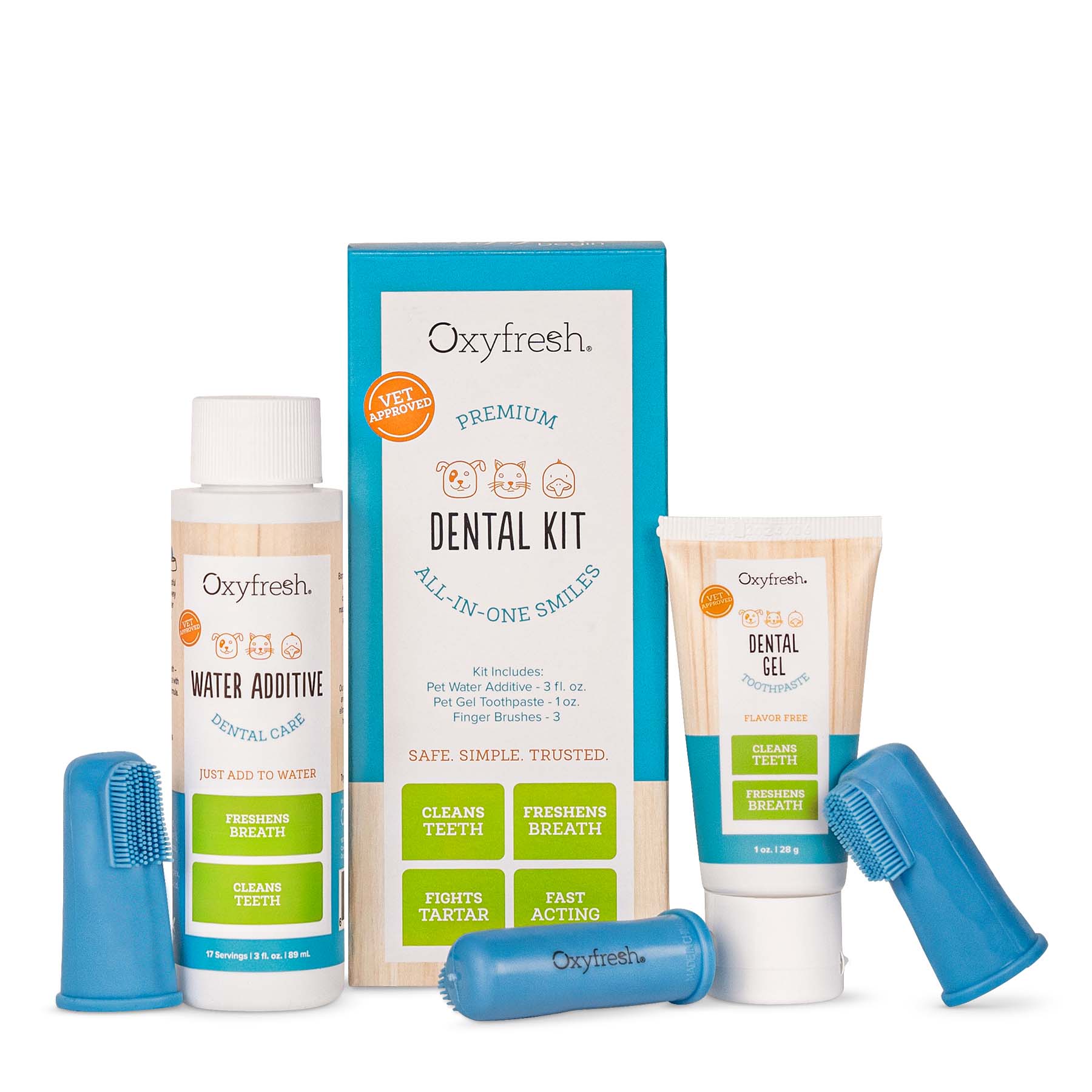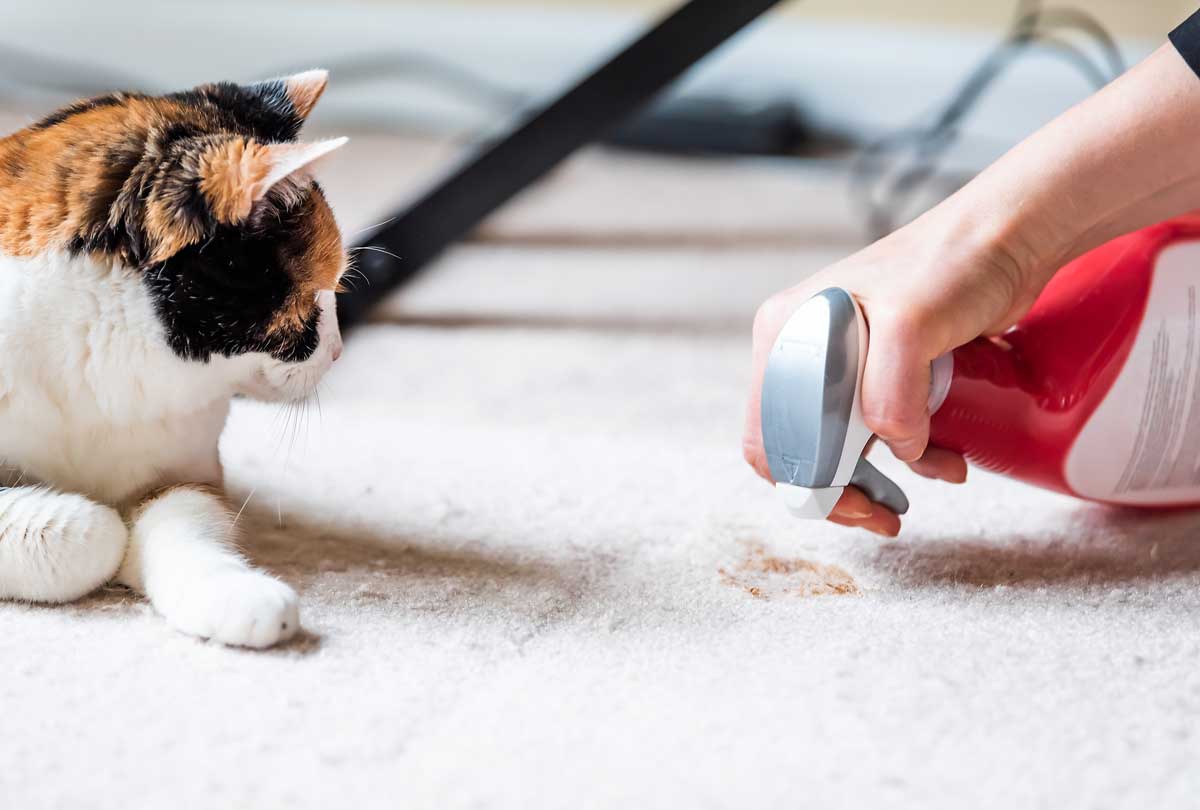"Yuck, your breath stinks!" How many times have you said this to your dog? Too many times to count? You’re not alone. According to a pet survey, over 50% of dog parents complain about their pooches’ bad breath.
Water additives for dogs claim to solve this problem, delivering a hands-off way to freshen stinky dog breath. (No toothbrushing – yay!) But do they really work or is it all just hype?
"Pupularity" Contest: Why Water Additives for Dogs Are So Trendy
Some pet parents still believe that bad breath is normal for dogs, but most have gotten the memo by now that it isn’t. Bad breath is often the first sign of gum disease, the most common health condition affecting pets. In fact, an estimated 90% of dogs have some form of gum disease by age two.
Ignoring the "smell-tale" signs of gum disease can lead to poor quality of life for dogs, as it’s painful and can hinder their ability to eat. Additionally, it can take 1–3 years off their lives if bacteria from their infected gums spread throughout their bodies.
Despite the urgency of dog dental care, only a fraction (around 7%) of dog parents brush their dogs’ teeth regularly. Too difficult, too time consuming, too much drama ... whatever the reason, this leads them searching for alternatives like dental water additives. Dog water additives offer an easy, fuss-free way to give pets dental care at home: you just pour straight into the dog’s water bowl and call it good.
Do Dog Water Additives Really Work?
Although water additives for dogs will never be as effective as brushing dogs’ teeth, they do offer similar benefits.
Like all products, quality counts. Instead of a water additive that merely MASKS bad dog breath, you’ll want one that targets harmful (and stinky) bacteria right at the source, via enzymatic or oxidation processes.
The goal with a canine water additive is to decrease plaque on the dog’s teeth, which is the secret to a healthier smile, less tartar and fresh dog breath.
Another perk to using a dog water additive is the dog’s water bowl will stay cleaner. You know what we’re talking about: less of that gross, slimy residue!
What Could Go Wrong? The Surprising Problem Surrounding Water Additives for Dogs.
While water additives are a simple way to deliver fresh breath for dogs and plaque-fighting abilities, the main problem with many products is the pets won’t drink them! That’s because they’re flavored with things like mint, green tea, pomegranate, beef flavors and the artificial sweetener erythritol.
Companies try to appeal to consumers with all these flavored water additives, but as for the dogs themselves, they just want their water to taste like, well, water! That’s the entire point of a dog water additive: to deliver dental care without the pet knowing it.
Much to their dismay, pet parents may find that dog water additives are a waste of money because the dogs won’t go near their water bowls. And if they’re stubborn (ahem, both dog and parent) and won’t budge on the matter for a while, the dog could become dehydrated.
Additionally, you’ll want to avoid dyes, which are found in many dental water additives for dogs. They're only in there to make the water look "pretty" ... they serve ZERO purpose and can trigger allergies in pets. (Don’t worry. There is a dye-free, unflavored dog water additive, and (hint, hint), it just happens to be the #1 bestseller on Amazon.)
What to Know About Stomach Sensitivity & Water Additives for Dogs
If your dog has a finicky stomach, you may be concerned about using a dog water additive. (No one likes to pick up loose stools in the yard, after all.) A simple way to make sure your sensitive dog does well with a water additive is to introduce it slowly ... for instance, starting out with half the recommended amount and then working your way up to a full dose.
Can You Use a Homemade Dog Breath Freshener?
We all love a good DIY hack, and dog breath fresheners are no exception. While the jury is still out on their effectiveness, here are the two most popular homemade dog breath fresheners ...
#1. Parsley Homemade Dog Breath Freshener
Putting parsley into a dog’s water dish is often touted as a natural dog breath freshener. Parsley is safe for dogs in small quantities (too much is not good because it’s a diuretic), but here’s the distinction: it needs to be curly-leafed parsley, as other varieties can be toxic to our canine friends.
While parsley does help to freshen, the effects are short-lived. If your dog has bad breath due to gum disease, a few sprigs of parsley in the water bowl likely will not make much difference. And if the dog does not like the taste of parsley, there’s no point in wasting it. (Hello, groceries are expensive enough!) If your dog IS partial to parsley, you can also sprinkle a bit over their dry dog food to neutralize "dog food breath" post-meal.
#2. Coconut Oil Homemade Dog Breath Freshener
Coconut oil is all the rage these days, for both humans and their canine companions. Coconut oil is purported to help dogs’ digestion and support healthy skin and a glossy coat, as well as act as a natural dog breath freshener. If you decide to use coconut oil as a homemade dog breath freshener, just make sure it’s unrefined or virgin coconut oil.
The coconut oil can either be mixed in your dog’s water or mixed into their hard food. (Some pet parents even use it as a natural toothpaste.) Start out with this dosage: ¼ tsp. for small dogs and 1 tsp. for large dogs. Keep in mind that coconut oil should not be given to dogs who are overweight, have digestive problems, or have high risk of pancreatitis. Play it safe and talk to your vet before giving your pet coconut oil.
Is It Better to Buy a Dog Water Additive with the VOHC Seal?
The Veterinary Oral Health Council (VOHC) seal means that a product has met VOHC standards for effectiveness in reducing plaque and tartar. You’ll see this seal on a product’s packaging. (The VOHC seal is especially helpful when shopping for pet dental treats, as many treats don’t do much for oral health.)
But when it comes to water additives, a VOHC seal doesn’t tell the whole story. Here’s why: to have the VOHC seal, a product must undergo two trials of animal testing. For brands that are certified cruelty-free and never test on animals, they CAN’T get the VOHC seal. However, that doesn’t mean their products don’t work. It's best to research the brand you want to buy, check out reviews, and most importantly, ask your veterinarian for what they recommend.
Eye-Spy: Ingredients You Want in a Water Additive for Dogs
- Stabilized chlorine dioxide: Just to be clear, stabilized chlorine dioxide is molecularly different than the chlorine you’ll find in swimming pools. (We would never advocate drinking pool water – ick!) The Environmental Protection Agency recognizes chlorine dioxide use as a drinking water purifier, and it’s commonly used to treat municipal water systems, ridding them of fungi and harmful bacteria. With dog smiles, stabilized chlorine dioxide works the same way, oxidizing (eliminating) harmful bacteria that cause dog plaque and bad breath.
- Zinc Gluconate: The role of zinc gluconate in pet dental water additives is to enhance antimicrobial action and protect tooth enamel from destructive bacteria. It also helps neutralize volatile sulfur compounds, the molecules responsible for bad breath.
- Sodium Citrate: This is a salt of citric acid, an organic acid that occurs naturally in citrus fruits, corn, and other foods. In dog dental water additives, it helps prevent plaque and tartar buildup while regulating the pH of your pet’s smile.
Oxyfresh Dental Care Water Additive Delivers the Fresh-Breath Trifecta
Oxyfresh, a trusted brand in dog dental care since 1984, is proud to offer the #1 dog water additive on the market.
Flavor-free Oxyfresh Dental Care Water Additive features the fresh-breath trifecta with a proprietary blend of stabilized chlorine dioxide (Oxygene®) plus zinc and sodium citrate. These ingredients work together to quickly neutralize plaque- and bad breath-causing bacteria, making it an essential defense against pet gum disease.
For pet parents who don’t have the time or desire to brush their dogs' teeth, this is the vet-approved solution that delivers similar benefits but without all the hassle. Oxyfresh Dental Care Water Additive is picky-pet approved and makes doggie dental care so easy. Just add to water!
- Made in USA
- Free of flavors & dyes
- Non-toxic & cruelty-free
- Fresh breath for dogs with every drink
- Fights plaque, tartar & periodontal disease
Discover how easy fresh breath for dogs can be with a little help from the pet experts at Oxyfresh.

